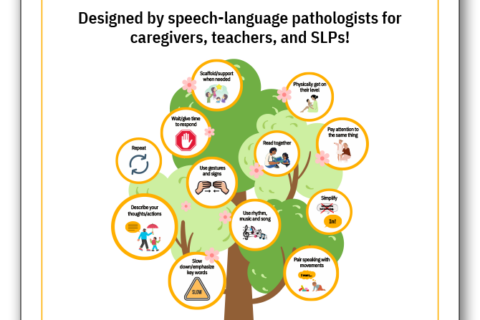How to Prepare for Your First Speech Therapy Appointment
Perhaps your toddler’s speech doesn’t sound as clear as their peers’ and you’re wondering if they will grow out of it, or if they need support. Maybe you’ve moved into a new leadership position with increased public speaking demands, or you’d like some strategies to modify a stutter you’ve lived with since childhood so you can professionally excel. It may be you have recently been discharged from the hospital following a stroke, and you are seeking to continue to strengthen and recover your ability to think and speak in the way you would like.
Whatever brings you to speech therapy, you’ve made the call. You’ve booked the appointment. You may be wondering if there’s anything else you need to do to prepare for your first session. This blog will provide an overview of what you can expect at your first appointment.
Speech Therapy Evaluation
Every speech therapy program begins with a comprehensive evaluation conducted by one of our expert-trained, licensed speech-language pathologists.
This will include a thorough case history where we will gather details about relevant medical history, symptom progression and frequency, speech and language development, academic/professional performance, and the impact challenges are having on daily functioning and confidence.
You or your loved one will then be guided through a series of assessments by your clinician to gather baseline data which will help us to better understand your unique set of needs and goals.
For pre-schoolers, testing will include a mix of standardized measures integrated with play. We are looking for information to gain a deeper understanding of your child’s speech, language, pre-literacy, and feeding skills. Parent and caregiver involvement is sometimes encouraged during testing to facilitate comfort and ease and to elicit skills most naturally. We will also ask questions to learn more about your observations and concerns for a complete picture of your child’s abilities.
For school-aged children, testing will more closely mimic school-based skillsets and the language teachers use with students in the classroom. This will include the administration of standardized measures and participation in functional activities, such as reading and telling stories, answering inferencing questions, following directions and procedures, and producing narratives or stories. Reading comprehension and written language may also be examined to provide a more comprehensive profile of your child’s speech, language and literacy skills and how those skills are integrated to help the child communicate and learn. Parents are invited to wait in the lobby while testing takes place.
For adults, the evaluation process will depend on a person’s individual needs, medical background, and goals. In other words, the assessment will be individualized for your specific needs and will include a combination of conversation with your clinician, standardized assessments, and other types of examinations to identify areas of difficulty and establish goals. For individuals who are interested in working on articulation, voice, fluency, or public-speaking, the appointment will typically be one hour in duration; however, for those with cognitive communication complaints or a neurological condition such as stroke or TBI, the evaluation could be several hours spread out over multiple days.
Speech-Language Assessments
Speech-language pathologists (SLPs) must administer a variety of standardized and informal diagnostic measures and procedures to determine their clients’ eligibility for therapy. Baseline data must be gathered and accurately interpreted to understand where a client is starting and to set appropriate goals, treatment targets, mode of treatment, and other factors necessary for successful outcomes.
Information gleaned from diagnostics helps to illuminate personal strengths and challenges, as well as responsiveness to trialed therapy techniques. These factors and others help our specialists determine a diagnosis as well as a prognosis for improvement. We will then discuss findings from the evaluation and work with you to establish a plan of action to help you or your loved one strengthen and rebuild one’s life, improve communication/voice/swallow skills, or enhance personal and professional communication delivery.
How Long Does an Evaluation Last?
Depending on the nature of your concern, diagnostic testing may take anywhere from one 60-minute session to five 60-minute sessions.
For individuals with multiple areas of concern including speech, language, voice, literacy, cognitive-communication, and/or swallowing challenges, multiple days of testing are recommended to comprehensively investigate all facets of communication and swallowing as well as how these areas collectively impact symptom presentation to develop a holistic and effective treatment plan. The impact of frustration, stress, anxiety and other internal states have on communication is also assessed to help your clinician design strategies to prevent and manage an increase in symptoms when experiencing these emotions.
A longer assessment process is usually recommended for individuals with cognitive communication difficulties, people recovering from a stroke or traumatic brain injury, or for children with multiple areas of need.
Individuals seeking an assessment for support with articulation, voice, fluency, or to enhance public speaking and communication delivery usually require one 60-minute evaluation.
What Happens in the First Session?
The goal of the first speech therapy session is to establish a strong connection with your therapist and orient to the exercises and materials that will be used in treatment. This involves getting to know each other, reviewing evaluation results in greater detail, aligning on goals and expectations for therapy, and reviewing both the underlying rationale for using a particular treatment method as well as discussing what will be involved in each session.
You and your loved one will have an opportunity to ask your clinician questions. You will be introduced to and will have an opportunity to practice exercises that will be used during your treatment program. Your clinician will also review home exercise protocols and how to monitor progress.
For those working on voice and swallowing, your therapist will additionally review any necessary vocal hygiene, stretches, and swallowing precautions.
Speech Therapy at Open Lines®
At Open Lines®, we recognize that lasting and impactful change goes beyond simply treating symptoms. Our approach is holistic and involves open and collaborative discussions to ensure everyone is aligned and excited about their speech therapy goals so we can help you or your loved one live life with confidence as quickly as possible.
If you’re struggling with communication difficulties, it’s time to turn to Open Lines®. Contact us via phone (212-430-6800), email [email protected], or by filling out our convenient contact form. Improve your communication skills and unlock your potential with Open Lines® Speech and Communication in New York today!
Get in Touch With Open Lines®














